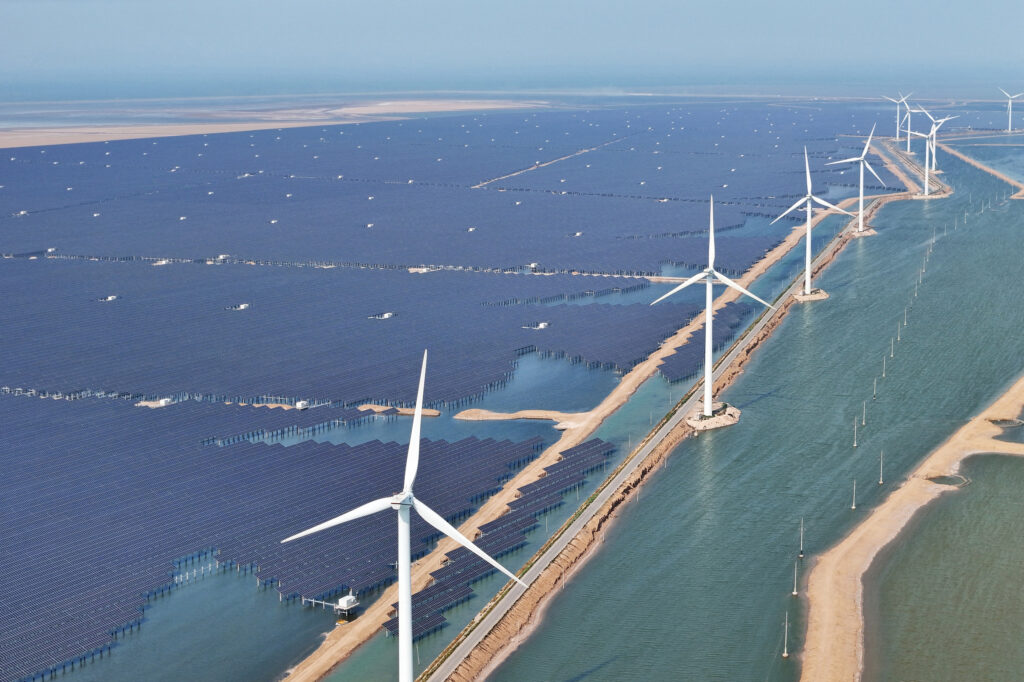Virginia’s largest utility received approval from its state regulators to construct a liquified natural gas storage facility for two of its gas-fired power stations in the Southside region of the state, despite opposition from environmental groups that favor more renewable energy.
Dominion Energy received approval from the State Corporation Commission Monday to build the 25-million gallon LNG storage facility, capable of storing up to 2 billion cubic feet. The tank would be for the utility’s 1,358-megawatt Brunswick and 1,588-megawatt Greensville power stations—both of which use combined cycle turbines that burn gas and capture steam—and are named after the counties they’re located in.
“The Project is needed to maintain a readily available, safe, and reliable fuel source for Brunswick County and Greensville County Power Stations in the event of a natural disaster, extreme weather, or other supply disruptions or constraints,” said Jeffirey G. Miscikowski, Dominion Energy vice president of project construction, in testimony on the facility.
The utility did not respond to a request for comment on the approval.
We’re hiring!
Please take a look at the new openings in our newsroom.
See jobs
“The two power plants that this facility will serve are both less than a decade old, each with more than a billion-dollar price tag,” Grayson Holmes, a Southern Environmental Law Center senior attorney, said in a statement raising concern about additional fuel costs. “Even though customers are still paying off these expensive power plants, already Dominion is coming back and asking customers for another billion to run the plants. This is another example of the hidden costs and risks of gas—risks that customers will be vulnerable to for years to come.”
The State Corporation Commission approved the project after Dominion argued the need for it, in part, because of past cold-weather events like Winter Storm Elliot around Christmas 2022, which led gas production wells to freeze and constrained supply of fuel delivery to natural gas-fired power plants.
“As all parties appear to recognize, the severity and frequency of severe weather events has increased and will likely continue to increase in the future,” the commission wrote. “While the full extent of the benefit this Project will provide when these severe weather events occur was debated over the course of this proceeding and will be revealed in time, no party asserted that the Project would be detrimental to reliability during these events.”
While encouraging efforts to improve reliability of the grid, the Virginia Office of the Attorney General was one of those parties that noted in testimony before the SCC that the facility’s potential benefits “hinge on the occurrence of abnormal events.”
“Both Staff and Consumer Counsel noted that in at least the last twenty years, the Company has never experienced a customer outage, due to fuel supply disruption or curtailment of any generating station on its system, the kind of events the LNG Storage Facility is intended to mitigate,” wrote Carew S. Bartley, assistant attorney general.
Following Winter Storm Elliot, reports from regional grid operator PJM Interconnection, the Federal Energy Regulatory Commission and the North American Electric Reliability Corporation highlighted the need to prepare for weather events, which are becoming more severe due to climate change. In December 2023, the Union of Concerned Scientists argued that power plants themselves have a risk of failure during cold snaps.
“One of the freeze-vulnerable components repeatedly identified was sensing lines,” wrote Paul Arbaje, an energy analyst with UCS, while describing the lines that measure pressure and other metrics for transmitting devices. “Many power plant operators reported frozen transmitters as the cause of plant failures during the recent storms, but in fact, it was often the sensing lines attached to the transmitters that froze.”
The two plants generate enough electricity to power about 700,000 homes, or about a quarter of Dominion’s total generation fleet over the last five years. The plants could use fuel from the LNG storage tank to run both stations for about four days, or one for 8 days.
The storage tank could increase the effective load carrying capacity, or ELCC, that assigns a reliability value to generation sources, and could generate an additional $52 million in revenue when electricity from the two facilities is sold under forecasted 2028 prices.
Operation of the tank, which involves storing natural gas in a liquid form and regasifying it, could produce about 68,919 tons of carbon dioxide-equivalent emissions, without accounting for emissions created by the Mecklenburg Electric Cooperative that would provide electricity to the tank and the three natural-gas fired backup generators. The emission expectation represents about a 1.1 percent increase to about 6 million tons of carbon dioxide equivalents the stations emitted in 2023.
This story is funded by readers like you.
Our nonprofit newsroom provides award-winning climate coverage free of charge and advertising. We rely on donations from readers like you to keep going. Please donate now to support our work.
Donate Now
Construction is expected to begin this year and be completed by the end of 2027. The facility would be built on a 25-acre parcel owned by the company and adjacent to the Greensville Power Station, while relying on existing natural gas infrastructure between the two power stations and a connection to the Transcontinental Gas Pipe Line Company that fuels both plants.
Miscikowski added in his testimony that construction will provide about 400 total jobs throughout the project. He said the project would produce an increase of $700,000 in annual local and state tax revenue and $17.5 million in local economic activity, with six full-time jobs once operational.
“The combination of these factors makes this an opportune time to move forward with the LNG Storage Facility,” Miscikowski said.
The LNG facility comes with an estimated capital cost of $547 million. The amount the utility is allowed to recover over the life of the project is estimated at between $1.07 billion and $1.45 billion. That equates to an increase of between $5 and $12.50 annually for the average residential customer, Holmes explained, using information from the utility.
According to Dominion’s environmental justice analysis, four census block groups within a one-mile radius around the project are communities of color, with two of the block groups being low-income.
After SCC staff did their own analysis, and found that the community had opportunities for involvement through a variety of ways, the commissioners stated that “the Project will not have a disproportionate adverse impact on economically disadvantaged or minority communities.”
The project approval also comes as Dominion Energy is also seeking approval for a natural gas plant in Chesterfield County to provide electricity during peak demand on the grid, which is projected to increase its load about 5.5 percent annually over the next 15 years, largely because of data center development.
Along with solar, wind, battery storage and small modular reactor technologies to meet that demand growth, Dominion Energy said in its latest Integrated Resource Plan, a non-binding planning document, that it is incorporating about 20 percent of its mix to come from carbon-emitting sources—up from about 5 percent included in its 2023 plan.
Environmentalists and ratepayer advocates argue that those plans come as the utility is bound by the Virginia Clean Economy Act, a law seeking to decarbonize Virginia’s grid by mid-century. Under the law, Dominion’s fossil fuel generation sources can’t stay online past 2045 unless there’s a concern for maintaining reliability of the electric grid.
The LNG storage facility can last for 30 years, but absent a reliability waiver to keep the two power stations running past 2045, it would only be needed for 18, SCC staff noted. A shorter lifespan increases the annual cost for ratepayers by $1-$2, with operation and maintenance costs spread out over less time.
“This is not the time for Virginia utilities to spend their customers’ money on large new fossil fuel infrastructure projects,” said Peter Anderson, director of state energy policy at Appalachian Voices, an environmental nonprofit that argued against the LNG storage facility. “Not only can clean technologies like large-scale batteries provide real reliability benefits, but to comply with the law and meet our climate goals this expensive project may soon become a stranded asset.”
About This Story
Perhaps you noticed: This story, like all the news we publish, is free to read. That’s because Inside Climate News is a 501c3 nonprofit organization. We do not charge a subscription fee, lock our news behind a paywall, or clutter our website with ads. We make our news on climate and the environment freely available to you and anyone who wants it.
That’s not all. We also share our news for free with scores of other media organizations around the country. Many of them can’t afford to do environmental journalism of their own. We’ve built bureaus from coast to coast to report local stories, collaborate with local newsrooms and co-publish articles so that this vital work is shared as widely as possible.
Two of us launched ICN in 2007. Six years later we earned a Pulitzer Prize for National Reporting, and now we run the oldest and largest dedicated climate newsroom in the nation. We tell the story in all its complexity. We hold polluters accountable. We expose environmental injustice. We debunk misinformation. We scrutinize solutions and inspire action.
Donations from readers like you fund every aspect of what we do. If you don’t already, will you support our ongoing work, our reporting on the biggest crisis facing our planet, and help us reach even more readers in more places?
Please take a moment to make a tax-deductible donation. Every one of them makes a difference.
Thank you,
















